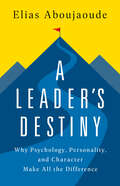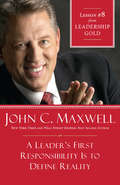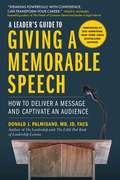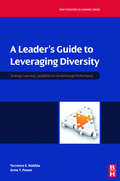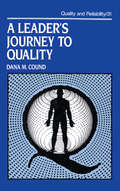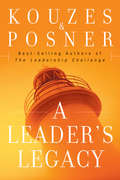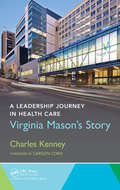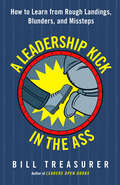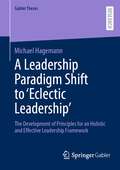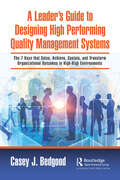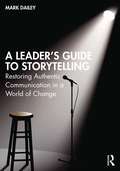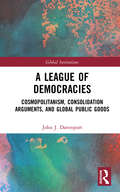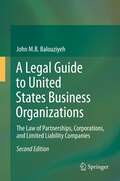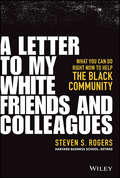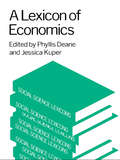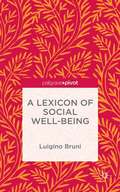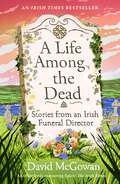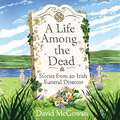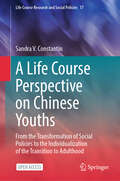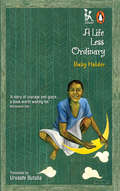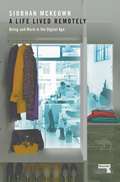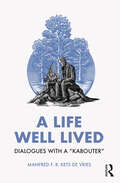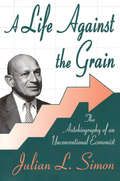- Table View
- List View
A Leader's Destiny: Why Psychology, Personality, and Character Make All the Difference
by Elias AboujaoudeA psychiatrist puts leadership &“on the couch,&” with a provocative exploration of its crucial, often ignored, psychological and personal character foundations. Elias Aboujaoude&’s distinctive exploration of leadership explains how our cultlike obsession with leadership gives narcissists and sociopaths an edge and results in leadership failure everywhere we look—and how resisting the imperative to rise at all costs leaves many with an inferiority complex. His takedown of the leadership industrial complex pokes a very sharp elbow into an industry seemingly united in a modern form of alchemy to create leadership gold—a waste of time and money, Aboujaoude vividly illustrates, since leaders emerge from a unique combination of personal, psychological, and situational factors that cannot be easily controlled or manipulated, no matter how gifted the executive coach. This bracing take on a classic subject provides new insight into the way psychology aligns with the requirements of effective and happy leadership. The result is to empower us to understand ourselves and step up if we have what it takes to lead—or find equally rewarding, often superior, ways to achieve fulfillment if we don&’t.
A Leader's First Responsibility Is to Define Reality
by John MaxwellSmart leaders learn from their own mistakes. Smarter ones learn from others' mistakes--and successes. John C. Maxwell wants to help you become the smartest leader you can be by sharing Chapter 8, A Leader's First Responsibility is to Define Reality, of Leadership Gold with you. After nearly forty years of leading, Maxwell has mined the gold so you don't have to. Each chapter contains detailed application exercises and a "Mentoring Moment" for leaders who desire to mentor others using the book. Gaining leadership insight is a lot like mining for gold. You don't set out to look for the dirt. You look for the nuggets. You'll find them here.
A Leader's Guide to Giving a Memorable Speech: How to Deliver a Message and Captivate an Audience
by Donald J. PalmisanoExpert advice on delivering an unforgettable, stirring talk or lecture! &“Highly readable, immediately useful and deeply enjoyable!&” —John J. Nance, Aviation Analyst , ABC World News &“Insights on avoiding panic and other pitfalls, the use of rhetorical devices, and how to wow audiences from this masterful speaker who has done over 1000 speeches and interviews.&” —John N. Kennedy, United States Senator for Louisiana A good leader must be intelligent, charismatic, strong, and inspiring. A good leader must stir passion and instill knowledge in the minds of followers, whether in the field of business, medicine, politics, sports, or entertainment. A memorable speech is a powerful tool for demonstrating leadership and inspiring listeners for years to come. You can give a stirring, memorable speech, and be seen as a real leader, and Donald J. Palmisano can help you. Here Palmisano shares proven tips on delivering an inspiring and motivating speech. Drawing from his popular seminar at Tulane University School of Medicine and over 1,000 speeches and interviews, Dr. Palmisano teaches readers how to:Use rhetorical devices effectivelyStay on messagePractice deliveryGlean lessons from great speeches of powerful leaders from the past, such as Cicero, Winston Churchill, Dr. Martin Luther King, Jr., and Ronald ReaganOrganize speeches to emphasize the messageWeave in stories that are unforgettableAnd more!If you are a professor or teacher, if you are a CEO or manager, if you are thinking of running for office or trying to raise money, then A Leader's Guide to Giving a Memorable Speech belongs on your bookshelf. It's a great gift for anyone with aspirations of teaching, leading, or managing.
A Leader's Guide to Leveraging Diversity
by Anne Power Terrence MaltbiaLeveraging Diversity: Strategic Learning Capabilities for Breakthrough Performance is designed to help business leaders and diversity practitioners alike conquer the complexity and take advantage of the opportunities associated with working productively with diversity. The book presents a clear direction for building the strategic learning capabilities needed to create and sustain adaptive organizations that effectively respond to today’s competitive demands. It provides a practical guide that features a variety of proven learning practices for leveraging diversity with case examples and planning tools. The book is structured in four parts and each chapter addresses one of the three strategic learning capabilities: contextual awareness, conceptual clarity, and taking informed action. Each chapter presents cutting edge practices in support of building the targeted learning capability. They contain case examples and sample tools to assist the reader as they internalize the practices and provide guidelines for applying the tools to their specific work situations. In the final part of the book, the reader is introduced to the three critical success factors necessary to support the successful execution of the strategic learning capabilities for leveraging diversity examined in this book. Whether the reader is new to diversity work or wishes to learn how to further leverage existing diversity initiatives with other strategically important business priorities, this book provides a comprehensive blueprint for navigating the complex and changing nature of situations involving diversity.
A Leader's Journey to Quality
by Dana M. CoundThis book deals with the "hard skills" involved in achieving leadership quality. It provides a vehicle to foster interaction of the elements of the modern approach to quality, including statistical applications, quality and reliability engineering, management, and motivational aspects.
A Leader's Legacy
by Barry Z. Kouzes James M. PosnerIn this provocative book, leadership experts and authors of the best-selling The Leadership Challenge, Jim Kouzes and Barry Posner take on a unique challenge and explore the question of leadership and legacy. Kouzes and Posner examine in twenty-two chapters the critical questions all leaders must ask themselves in order to leave a lasting impact. These powerful essays are grouped into four categories: Significance, Relationships, Aspirations, and Courage. In each essay the authors consider a thorny and often ambiguous issue with which today's leaders must grapple issues-such as how leaders serve and sacrifice, why leaders need loving critics, why leaders should want to be liked, why leaders can't take trust for granted, why it's not just the leader's vision, why failure is always an option, why it takes courage to "make a life," how to liberate the leader in everyone, and ultimately, how the legacy you leave is the life you lead.
A Leadership Journey in Health Care: Virginia Mason's Story
by Charles KenneySince adapting the principles of the Toyota Production System to health care in 2002, Virginia Mason Health System has made enormous leaps forward in quality, safety, patient experience of care, and affordability. It has achieved world-class levels of patient satisfaction and has been honored as one of the safest hospitals in the country.A Leadersh
A Leadership Kick in the Ass: How to Learn from Rough Landings, Blunders, and Missteps
by Bill Treasurer"This is one of the most unique and valuable books you will read all year, and I highly recommend it."—Jim Kouzes, coauthor of the bestselling and award-winning The Leadership Challenge and Dean's Executive Fellow of Leadership, Leavey School of Business, Santa Clara UniversityEven the best leaders—in fact, most of the best leaders—start out as decidedly bad ones. And sooner or later they reach a moment of reckoning that leadership expert Bill Treasurer calls the leadership kick in the ass. When it happens, it feels like it's all over. But Treasurer says that with the right attitude, that kick can be a new beginning. Based on his work with thousands of leaders, this book reveals how to turn those ego-bruising events into the kind of transformative experiences that mark the paths of great leaders. As Steve Jobs famously said, "Getting fired was the best thing that ever happened to me." This book is a survival guide, coach, and morale booster to help you use that kick to move forward instead of fall down. If you succeed, the next place you get kicked might be upstairs.
A Leadership Paradigm Shift to ‘Eclectic Leadership’: The Development of Principles for an Holistic and Effective Leadership Framework (Gabler Theses)
by Michael HagemannThe objective of this book is to develop leadership principles from two directions - the scientific and the practical perspective - that are both application-oriented and universally applicable as well as effective and flow into a holistic leadership framework. Both the hermeneutic and the empirical analysis show that the basic principles of holistic, application-oriented, universally applicable and effective leadership can be described with the duality of transactional management and transformational leadership principles, taking into account core traits and alignment with follower needs. These in turn lead to a collection of essential principles of effective leadership known as the "eclectic leadership framework". The essential finding is that the basic principles are complementary and that a clear focus on people and their needs is the most effective way to lead.
A Leader’s Guide to Designing High Performing Quality Management Systems: The 7 Keys that Solve, Achieve, Sustain, and Transform Organizational Outcomes in High-Risk Environments
by Casey J. BedgoodThe genesis of this book is over two decades of experience working with leaders who struggle with the concept of Quality Management System (QMS). Often, leaders fail to understand this concept, implement ineffective QMS models and subsequently are disrupted from their roles. More important and even more impactful are the consequences a poorly designed and executed QMS model has on organizational stakeholders including customers.The purpose of this book is to provide a simple leadership quick guide for designing high-performing Quality Management System models. This guide will focus on Quality Management System assessment, structure, process and achieving outcomes through practical real-world tools, templates, and models. The test of any model is its outcomes. This book will provide decades of insight so leaders ensure their QMS model Solves Problems, Achieves Outcomes, Sustains Wins, and Transforms Organizational Outcomes in High-Risk Environments.The intended audience for this book includes but is not limited to: top executives, governance members, leaders of any rank, thought leaders, strategists, students, performance improvement leaders, change agents, teachers, and anyone interested in quality, improvement, strategy, and leadership. Regardless of role, organization type, or industry, quality matters and is a focal point for customers. Thus, those leading the charge for excellence in this arena must have a good structure, process, and measurable outcomes sustained over time.So, why is this topic important? In today’s world, change is the new normal and only constant. In many industries, such as healthcare for example, the foundations of the industries themselves are shaking greater than at any other time in history. As change grows, so does the associated risk and disruption. How will leaders and their organizations succeed in high-risk environments without a good foundation? The short answer is they won’t. The starting point for success is the Quality Management System.By reading this book, readers will learn: How to construct a well-defined Quality Management System (QMS) How to identify and counter common misperceptions of QMS Techniques to engage other leaders in crucial conversations related to QMS gaps, illusions of success, perceived and real shortcomings, and measures of success How to conduct a basic and advanced assessment of Quality Management System models to determine what is working, what is not working, and high-risk areas to improve The required structural elements of high-performing QMS models A wholistic approach to the QMS process What measures constitute QMS success
A Leader’s Guide to Storytelling: Restoring Authentic Communication in a World of Change
by Mark DaileyPart manual, part memoir and part call to action, this book demonstrates why the core skill needed by leaders in the next decade and into the future will be authentic and effective communication. Communications based on character, integrity and values will be critical in helping leaders navigate the two mega trends of accelerated technological change and increasing demands for social change. This book is the first to marry practical advice on deepening communication skills with insight from a coaching and cognitive point of view into what techniques works and why, and to pull together the wider societal issues and the operating context for leaders. Counter-intuitive and written to provoke thought and awareness, the author looks at the psychological and emotional effects of our communications and what leaders can do to inspire and engage, guiding them through three sections: • A framework for effective communications • A toolkit, detailing what good looks like in practical situations • The authentic leader, an exploration of the changing communications landscape and why a different kind of leadership is needed C-suite executives, leaders about to take that last step into the C-suite or millennial leaders about to enter the boardroom will value this book as an advisory guide, as a handbook to be used in internal coaching and training sessions and as a manual and aide memoir for themselves.
A League of Democracies: Cosmopolitanism, Consolidation Arguments, and Global Public Goods (Global Institutions)
by John J. DavenportIn the 21st century, as the peoples of the world grow more closely tied together, the question of real transnational government will finally have to be faced. The end of the Cold War has not brought the peace, freedom from atrocities, and decline of tyranny for which we hoped. It is also clearer now that problems like economic risks, tax havens, and environmental degradation arising with global markets are far outstripping the governance capacities of our 20th century system of distinct nation-states, even when they try to work together through intergovernmental agreements and organized bureaucracies of specialists. This work defends a cosmopolitan approach to global justice by arguing for new ways to combine the strengths of democratic nations in order to prevent mass atrocities and to secure other global public goods (GPGs). While protecting cultural pluralism, Davenport argues that a Democratic League would provide a legal order capable of uniting the strength and inspiring moral vision of democratic nations to improve international security, stop mass atrocities, assist developing nations in overcoming corruption and poverty, and, in time, potentially address other global challenges in finance, environmental sustainability, stable food supplies, immigration, and so on. This work will be of great interest to students and scholars of international relations, international organizations, philosophy and global justice.
A Leap of the Mind: How Integrative Thinkers Connect the Dots
by Roger L. MartinThis chapter reviews three powerful tools for improving your integrative thinking capacity, offering aspiring integrative thinkers a few lessons from the work of Taddy Blecher, cofounder of CIDA City Campus, an innovative South African university.
A Legal Guide to United States Business Organizations: The Law of Partnerships, Corporations, and Limited Liability Companies
by John M. BalouziyehThis volume provides an overview of United States federal and state law governing business organizations. The chapters take the reader through a step-by-step exposition of the most basic sole proprietorships to the most complex multi-tiered conglomerates. Among the business organizations treated are partnerships with their various modalities (general partnerships, limited partnerships, limited liability partnerships), corporations (including closely held corporations, public corporations and other variations) and limited liability companies. The case law and statutes governing the full menu of business organizations are systematically analyzed and presented. Leading cases at both the federal and state level as well as model legislation such as the Uniform Partnership Act and enacted legislation are further examined. Other topics covered include Agency and partnerships, Accounting, taxation and finance, Startup corporations and venture capital, Fiduciary duties and shareholder control, Mergers and acquisitions.
A Letter from Prison
by Eugene SoltesStephen Richards, the former global head of sales at Computer Associates, Inc. (CA), is serving a seven year prison sentence for financial fraud. In the case, Richards responds to a number of questions about managerial responsibility and the manipulation of financial performance in a letter written to a graduate student.
A Letter to My White Friends and Colleagues: What You Can Do Right Now to Help the Black Community
by Steven S. RogersLearn how to address racial wealth disparity in the United States today From the life, professional experiences, and research of former Harvard Business School professor Steven Rogers, comes his boldly stated, A Letter to My White Friends and Colleagues. This informative epistle investigates the causes of racial wealth disparity in the United States and provides solutions for addressing it. Through extensive data and historical research, anecdotes, teaching, and case studies, it presents practical ways White people can work with and help the Black community. It teaches readers that eliminating the $153,000 wealth gap between Black and White people is the solution to over 75% of our problems and offers solutions to help improve Black-White racial relations in the United States. In straightforward language, filled with facts, stories, advice, and sometimes even humor, A Letter to My White Friends and Colleagues encourages every White person to share his/her wealth with the Black community—plain and simple. This book recommends that you spend a portion of your annual household budget with Black-owned companies. If more money is spent at Black-owned businesses, those companies can grow and create more jobs for Black people. Rogers also proposes White people make large savings deposits into Black-owned banks. These are the financial institutions that are the backbone of the Black community that provide loans to the Black community for businesses, education, automobiles, and home mortgages. And finally, he resolutely encourages White people to support government reparations to Black Americans who are descendants of Black men and women, who were enslaved from 1619 to 1865. Those who read the book will: Understand the root causes of racial disparities in America Discover how you can personally contribute to reducing the inequality between Black and White people in the United States today Get concrete recommendations on how to redirect your spending to Black-owned institutions to help decrease the racial wealth gap This groundbreaking book provides financial recommendations that you can put into practice today, using his helpful instructions in most of the chapters, to address the systemic inequality between White and Black Americans. Read A Letter to My White Friends and Colleagues and be part of the path forward.
A Lexicon of Economics (Social Science Lexicons #1)
by Jessica Kuper Phyllis DeaneAn invaluable work which serves as an introduction to the subject and as a reference for all those who need to remain up-to-date with economic thinking.
A Lexicon of Social Well-Being
by Luigino BruniWe must quickly learn how to live well in the world as it is today, including the realm of work. We need to learn a new vocabulary of economics and markets that is more suitable to understand the present world and that is likely to offer us the tools to act, and perhaps improve it as well.
A Life Among the Dead: Stories from an Irish Funeral Director
by David McGowanWhen death is a way of life . . .In A Life Among the Dead, David McGowan, Ireland's best known Funeral Director, and subject of the Award-winning Netflix documentary The Funeral Director, guides us through the business, the science and the unexplained elements of death.Alongside exploring the unique approach of Irish culture when it comes to grief and death, David seeks to demystify the process of dying and what happens to the body afterward.The only certainty when we come into this life is that we are going to leave it, and yet it's something most people are reluctant to discuss or allow themselves to think about. David's mission is to open up conversations and encourage people to have an understanding of their loved ones wishes as well as their own.Poignant, humorous and educational, this is an account of a life lived with purpose in the service of the dead.
A Life Among the Dead: Stories from an Irish Funeral Director
by David McGowanWhen death is a way of life . . .In A Life Among the Dead, David McGowan, Ireland's best known Funeral Director, and subject of the Award-winning Netflix documentary The Funeral Director, guides us through the business, the science and the unexplained elements of death.Alongside exploring the unique approach of Irish culture when it comes to grief and death, David seeks to demystify the process of dying and what happens to the body afterward.The only certainty when we come into this life is that we are going to leave it, and yet it's something most people are reluctant to discuss or allow themselves to think about. David's mission is to open up conversations and encourage people to have an understanding of their loved ones wishes as well as their own.Poignant, humorous and educational, this is an account of a life lived with purpose in the service of the dead.
A Life Course Perspective on Chinese Youths: From the Transformation of Social Policies to the Individualization of the Transition to Adulthood (Life Course Research and Social Policies #17)
by Sandra V. ConstantinThis open access book investigates from a life-course perspective the individualization process and the challenges faced by young adults in post-collectivist China, where people are enjoined to "liberate" (jiefang) their individual capacities, to "rely on themselves" (kao ziji) and to no longer "depend on the state" (kao guojia). Based on unique quantitative and qualitative data, this book provides a solid empirical portrait of Chinese youths and transformation of social policies in post-collectivist ChinaThis book will be a great resource to students, academics as well as social scientists and policy-makers who wish not only to understand how, in such a short period of time, young adults and their families have managed to navigate from a relatively egalitarian society to one of the most unequal, but also how the articulation between socialist and neoliberal ideologies is reconfiguring social and economic relations as well as women’s and men’s life-course.The basis of the English translation of this book from its French original manuscript was done with the help of artificial intelligence. A subsequent human revision and rewriting of the content was done by the author.
A Life Less Ordinary
by Baby HalderThis is the story of Baby Halder, a young woman working as a domestic in a home in Delhi. Hurriedly married off at the age of twelve, a mother by the time she was fourteen, Baby writes movingly and evocatively of her life as a young girl, and later as a young woman. The long absences of her father, the hardships faced by her mother, and her decision to walk out of her marriage, leaving Baby and her sister to manage the household, were the realities that shaped Baby's early life. When marriage came, Baby, still a child, yearned to play and study, but was burdened with the responsibility of being wife and mother while facing considerable violence from her husband. Escape finally came many years later, by which time the still young Baby was a mother of three, and she fled to the city in the hope of finding a job. Working in Delhi as a domestic help, Baby was lucky enough to come across an employer who encouraged her to read - which she did voraciously - and then to write. The story of Baby's life is a lesson in courage and survival. Since it was first published in Hindi, this book has become a bestseller, receiving accolades from some of the best-known writers and critics in India and elsewhere. It has also been translated into other Indian languages.
A Life Lived Remotely
by Siobhan McKeownWhat happens when we take our lives online? How are we being changed by immersion in the internet? How do we know the difference between work and life when one seems to blend into the other?Part memoir, part theory, A Life Lived Remotely tells the story of a transition to the digital age. It follows the author's journey through remote work, framing it within the exponential growth of the internet and the rapid spread of neoliberalism. It examines how we are being changed by the internet, how we experience that change, and at the anxieties and issues that arise. A moment's pause in a world of fast-paced communication, it provides a critical reflection on what it means to come of age along with the internet.
A Life Well Lived: Dialogues with a “Kabouter"
by Manfred F. Kets de VriesManfred Kets de Vries wears many “hats”—psychoanalyst, executive coach, consultant, management educator, researcher, writer—but he has noticed that whichever hat he is wearing, every question he is asked boils down to one thing: “How can I live a well-lived life?” Over many years of practice in all these disciplines, Professor Kets de Vries has realized the unsurpassed value of stories in tackling human dilemmas and providing answers to this question. The book is, therefore, one of the most important books he has written for coaches, students, leaders, managers, educators—or anyone seeking a more reflective text to guide them through the multitude of questions that we face in work and in life. He draws on a long literary tradition of the unexpected encounter with a wise “other,” fantastic or magical—think The Little Prince, Alice's Adventures in Wonderland, The Once and Future King, the Harry Potter novels—to animate an exploration of the deepest questions and concerns of human beings. He constructs an extended Socratic dialogue between his two “selves”; the first a naïve traveler, lost in the Siberian wilderness, and the second a reflective avatar who comes to his aid. The avatar takes the form of a “kabouter,” a familiar figure in Dutch folklore whose counterpart can be found in different cultures around the world and throughout centuries of storytelling. Through stories, riddles, and puzzles, the kabouter challenges the traveler to question and reflect upon his life and values, guiding him—and readers—toward the insights that will help them achieve a life well lived.
A Life against the Grain: The Autobiography of an Unconventional Economist
by Julian L. SimonIn his long and distinguished career as a writer and scholar Julian Simon came to be known as one of the leading--and most controversial--authorities on population economics. An immensely productive writer, his work is unified by a basic core belief: that human intellect and ingenuity are ever-renewable resources in the use and preservation of natural resources. Inevitably, Simon's position provoked the hostility of doctrinaire environmentalists, both in academia and in the movement at large. However, Simon's arguments were invariably built from facts and powerful evidence that stood him well in many high-profile public debates. The first part of Simon's autobiography takes the reader through his childhood, his years as a midshipman and then as an officer in the Navy, plus a stint in the Marines, and his experiences as a copywriter in an advertising firm. Simon's plan after receiving his Ph.D. from the University of Chicago was to be an entrepreneur, which would afford him enough money to care for his parents and allow him free time for writing fiction. He ran a small mail-order business for two years, during which time he wrote his first book, How to Start and Operate a Mailorder Business, which has since gone through seven editions. Deciding to seek a professional career, in 1963, he accepted a position at the University of Illinois. Although he spent thirty-five years of his life as a faculty member at three universities, his autobiography contains almost no discussion of departmental affairs or university politics, topics about which Simon had little or no interest. Rather, after the personal chronology and experiences, the book includes substantive chapters on research methods, population economics, and immigration. It also explains how Julian Simon became the economist he was. He analyzes crucial periods in his life when he developed his ideas on fundamental issues. Written in an engaging and amusing manner, Julian Simon's autobiography is a combination of personal memoir and professional contribution to important ideas in economics, research methods, and demography. His observations and personal reflections will interest the general reader on a humanitarian level as well as environmentalists, sociologists, and economists on a professional level.
